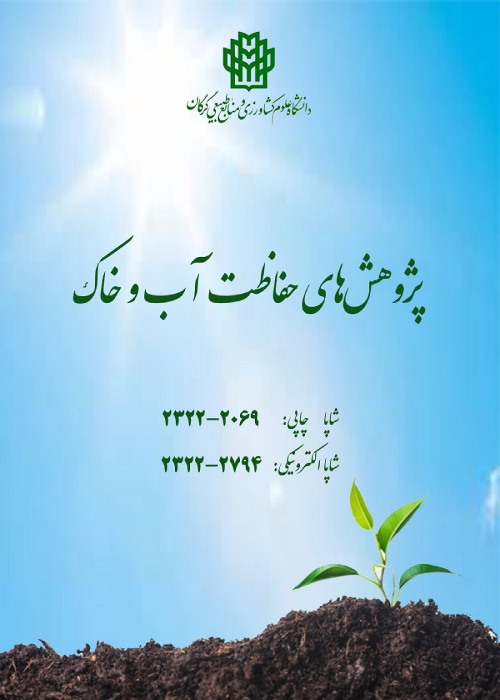Effects of grazing management on different forms of organic carbon in Peneti plain of Izeh area in Khuzestan province
Abstract:
Background And Objectives
Soil is a key resource that control the cycles of water, biota and geochemicals and the greatest organic matter reservoir. Little information is available about the effects of grazing on different forms of soil organic carbon in Khuzestan province pastures. Therefore, this study was conducted to evaluate the effects of grazing management on amount and forms of organic carbon in some pasture soils from Peneti plain of Izeh area in Khuzestan province.Materials And Methods
Accordingly, two adjacent pastures with different management (grazing and grazing exclusion) around the Izeh city were selected and then, random soil samples were taken from the surface (0 to 20 cm) and subsurface (20 to 40 cm) in 15 points. After air drying the soil samples and passing them through a 2 mm sieve, physical, chemical properties and forms of organic carbon including total organic carbon (TOC), permanganateoxidizable carbon (POXC), fine particulate organic carbon (FPOC) and coarse particulate organic carbon (CPOC), dissolved organic carbon (DOC) and microbial biomass carbon (MBC) of the soils were measured.Results
The results showed that grazing management has increased soil organic matter of surface and subsurface soils the values were statistically significant in the surface layers and increased the amounts of TOC (from 8.33 to 9.53 g kg-1), DOC (from 9.46 to 10.86 g L-1), MBC (from 418.1 to 456.2 mg kg-1), POXC (from 974.25 to 1035.3 mg kg-1), FPOC (from 430.6 to 450.7 mg kg-1) and CPOC (from 680.10 to 701.4 mg kg-1), but despite the increase in organic matter contents of subsurface soils the difference was not statistically significant. The effect of management practices, in order to have a significant effect to lower parts of the soil, it requires a longer period management. Comparing the biomass upon non-grazing (405 gm-2) and grazed (117 gm-2) areas, indicates a good condition of vegetation in the non-grazing and the effectiveness of enclosure in rehabilitation of pastures in the study area.Conclusion
The results showed that MBC, DOC and POXC are more sensitive than other forms of organic carbon to grazing management. They are more appropriate indicators for grazing management on organic carbon quality being added to the soil. Also, based on carbon stratification ratio index (CSRI), regarding different forms of organic carbon in the study area, non-grazing was one of the most proper and efficient management practices which improved soil quality. Accordingly, it seems that non-grazing practices should be considered as one of the major programs in renewable natural resources plans. On the other hand, the results indicate adverse effects of grazing on the quality of soil organic matter endangering the long-term sustainable production in pastures. Keywords:
Language:
Persian
Published:
Water and Soil Conservation, Volume:24 Issue: 3, 2017
Page:
113
magiran.com/p1748873
دانلود و مطالعه متن این مقاله با یکی از روشهای زیر امکان پذیر است:
اشتراک شخصی
با عضویت و پرداخت آنلاین حق اشتراک یکساله به مبلغ 1,390,000ريال میتوانید 70 عنوان مطلب دانلود کنید!
اشتراک سازمانی
به کتابخانه دانشگاه یا محل کار خود پیشنهاد کنید تا اشتراک سازمانی این پایگاه را برای دسترسی نامحدود همه کاربران به متن مطالب تهیه نمایند!
توجه!
- حق عضویت دریافتی صرف حمایت از نشریات عضو و نگهداری، تکمیل و توسعه مگیران میشود.
- پرداخت حق اشتراک و دانلود مقالات اجازه بازنشر آن در سایر رسانههای چاپی و دیجیتال را به کاربر نمیدهد.
In order to view content subscription is required
Personal subscription
Subscribe magiran.com for 70 € euros via PayPal and download 70 articles during a year.
Organization subscription
Please contact us to subscribe your university or library for unlimited access!


